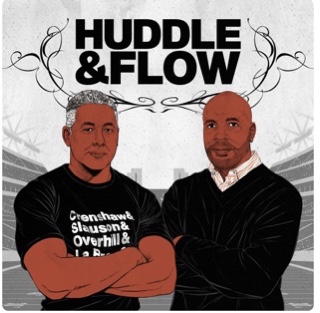When Jim Trotter and Steve Wyche talk about the National Football League, thousands of people listen. So it came as little surprise that they recently spurred an “oh yeah” from here while listening to them talk with Richard Deitsch on the Sports Media Podcast.
Trotter and Wyche, who recently launched their own podcast called Huddle & Flow, spoke about how they began to see a new brand of athlete activist after the killings of George Floyd, Breonna Taylor, Jacob Blake and others. Each one of these lives that were senselessly snuffed looked like 70 percent of NFL rosters. They were Black. And despite their star statuses, they knew that Taylor, Blake and the others could be one of them or someone they love.

Going into the 2020 NFL season, people who deal with things like TV ratings and merchandise sales wondered how player protests would affect an already challenged bottom line because of COVID-19. It was only four years ago that a “stick to sports” crowd criticized athletes who protested because it took away from their “escape.”
Wyche, the first to report about Colin Kaepernick when he took a knee as quarterback for the San Francisco 49ers, spoke about sports personnel that expressed concern about their need for younger fans to offset aging loyalists. Would more empowered and socially vocal athletes help or hurt chances to acquire Gen New?
Research shows that young demographics such as the coveted 18-49 age group increasingly show their loyalty to businesses that support causes for the greater good. They will take lower paying jobs to work for a company that commits to green spaces and racial diversity. They will move to work for a company that provides paid leave to care for an elder or infant. They purchase BPA and GMO-free products to protect their health and environment. So why wouldn’t they support sports leagues whose athletes use their platforms to create change in their communities, especially in those that have gone unchecked and unchallenged for years?
Trotter said that the argument he used four years ago was if the NFL did lose fans because some opposed player protests, “are you playing for the short game or are you playing for the long game? Are you going to respond to skittish sponsors or allow fans at this moment, jeopardize losing the young demographic?” He said that several, not all, team owners may have done an about-face this year when they saw demonstrations against racial injustice in the U.S. and abroad.
As with emerging and evolving brands, some team officials realize that young people will support who’s doing right in the world, and invite others to join them, whether it’s a protest or tailgate.
With people’s use of camera phones and other recording devices, a once ignorant public, by choice or chance, now sees that police brutality and systemic racism exists. What side will leagues ultimately choose when signage becomes part of the furniture and conversation isn’t as focused? Will team owners ignore fans that support more peaceful and respectful relationships among people of all races and genders, or will they ignore the interests of their own rosters that are comprised of 70 percent Black and Brown athletes? Those who stay silent are essentially stagnant and may well see their fan bases shrivel. As Trotter and Wyche said, the NFL is getting a do-over. Not many businesses get it.
©Gail Sideman, gpublicity.com 2020
###